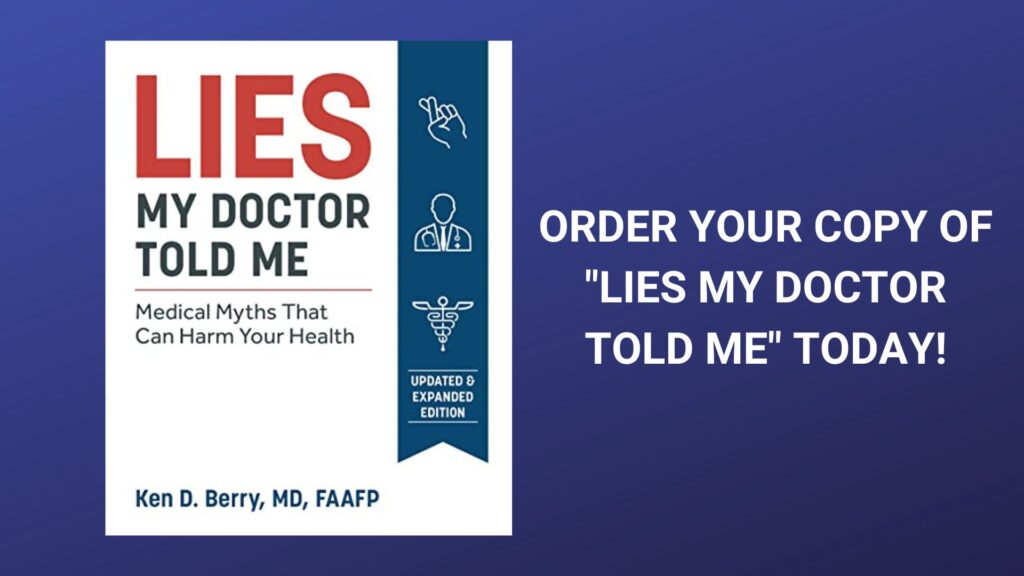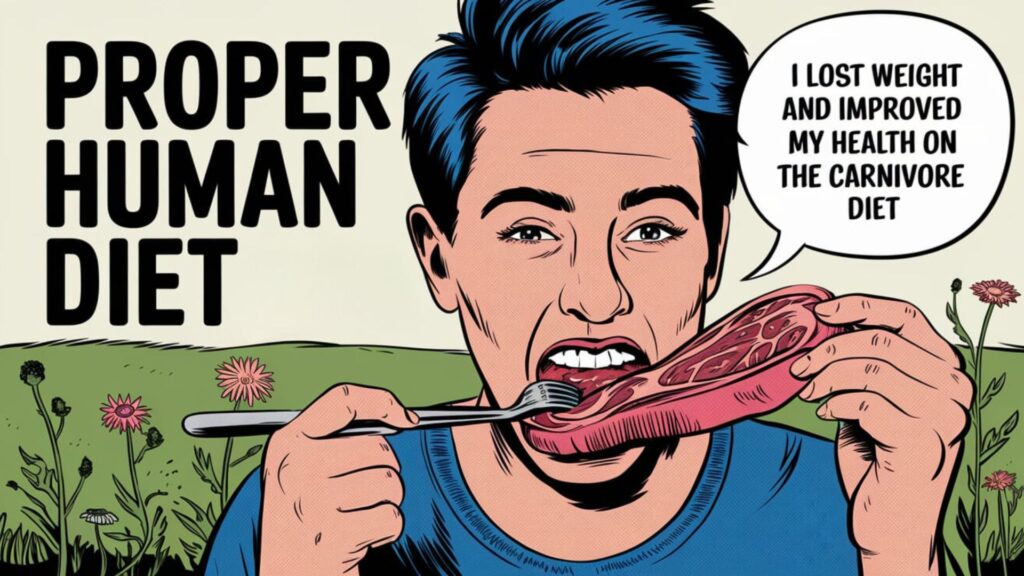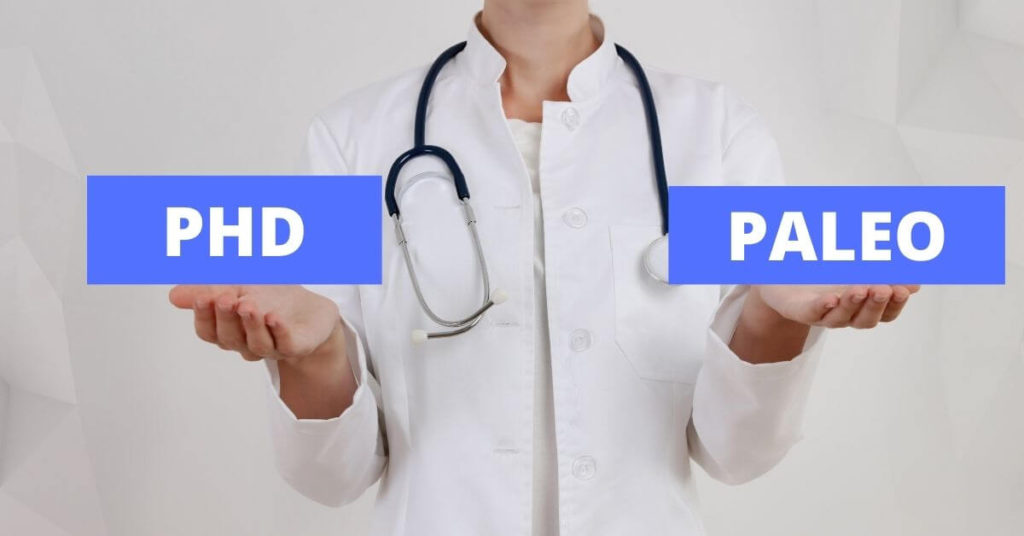Proper Human Diet: A Revolutionary Approach to Weight Loss and Inflammation
Are you tired of diets that promise the world but leave you feeling hungry, unsatisfied, and no closer to your health goals? Proper Human Diet (PHD) might be the answer you’ve been searching for. This innovative approach to eating has been making waves in the health and wellness community, offering a fresh perspective on nutrition that’s rooted in our ancestral past.
Proper Human Diet: Key Components
High-Quality Meats
Rich in protein and essential nutrients
Animal Fats
Promotes satiety and hormone balance
Low-Carb Vegetables
Provides fiber and micronutrients
Potential Benefits
- Weight Loss
- Reduced Inflammation
- Improved Energy
- Better Mental Clarity
Developed by Dr. Ken Berry, a board-certified family physician with over two decades of clinical experience, Proper Human Diet is more than just another fad. It’s a carefully crafted nutritional strategy that aims to align our modern eating habits with the dietary patterns our bodies evolved to thrive on.
In this comprehensive guide, we’ll explore how Proper Human Diet can be a game-changer for weight loss and reducing inflammation. We’ll dive into the science behind this approach, share practical tips for getting started, and hear from real people whose lives have been transformed by embracing this way of eating.
Daily Calorie & BMI Calculator
What is Proper Human Diet?
At its core, Proper Human Diet is a low-carbohydrate, high-fat eating plan that prioritizes animal-based foods. It’s often described as a type of ketogenic diet but with a specific focus on the quality and sourcing of animal products. The PHD eliminates grains, sugars, and processed foods while encouraging the consumption of nutrient-dense meats, organ meats, and animal fats.
Proper Human Diet: Key Principles
Prioritize Quality Animal Foods
Focus on high-quality meats, organ meats, and animal fats
Eliminate Processed Foods
Remove refined carbohydrates and industrialized foods
Limit Plant Foods
Minimize or exclude plants, especially those high in anti-nutrients
Focus on Nutrient Density
Choose foods based on nutritional value, not calorie content
Embrace Ancestral Eating
Align diet with evolutionary patterns of human nutrition
The Proper Human Diet is a low-carb, high-fat approach developed by Dr. Ken Berry, emphasizing animal-based foods and mimicking ancestral eating patterns.
Key principles of the Proper Human Diet include:
- Prioritizing high-quality animal proteins and fats
- Eliminating processed foods and refined carbohydrates
- Limiting or excluding plant foods, especially those high in anti-nutrients
- Focusing on nutrient density rather than calorie counting
- Embracing ancestral eating patterns
Dr. Berry argues that this approach more closely mimics the diet our ancestors evolved eating for hundreds of thousands of years before the advent of agriculture and industrialized food production.
The Science Behind Proper Human Diet
While the idea of a meat-focused diet might seem counterintuitive to those raised on conventional nutritional wisdom, there’s a growing body of research supporting the potential benefits of low-carb, high-fat diets for weight loss and inflammation reduction.
Ketosis and Weight Loss
One of the primary mechanisms by which the Proper Human Diet may promote weight loss is through inducing a state of nutritional ketosis. By drastically reducing carbohydrate intake, the body shifts from using glucose as its primary fuel source to burning fat for energy.
A 2020 study published in the Journal of Clinical Investigation Insight found that a ketogenic diet led to significant weight loss and improved body composition in overweight adults over a 45-day period. Participants lost an average of 12% of their body weight, with most of the loss coming from body fat.
Inflammation Reduction
Chronic inflammation is increasingly recognized as a root cause of many modern diseases, including obesity, diabetes, and heart disease. The Proper Human Diet may help combat inflammation through several mechanisms:
- Reduced sugar intake: High sugar consumption has been linked to increased inflammation. A 2018 review in the Journal of Endocrine Society found that reducing added sugars in the diet led to decreased inflammatory markers.
- Increased omega-3 fatty acids: The PHD’s emphasis on grass-fed meats and wild-caught fish naturally increases the intake of anti-inflammatory omega-3 fatty acids. A 2021 meta-analysis in the journal Nutrients found that higher omega-3 intake was associated with lower levels of inflammatory markers.
- Elimination of potentially inflammatory foods: By removing grains, legumes, and processed foods, the PHD eliminates many common triggers of inflammation for some individuals.
Getting Started with Proper Human Diet
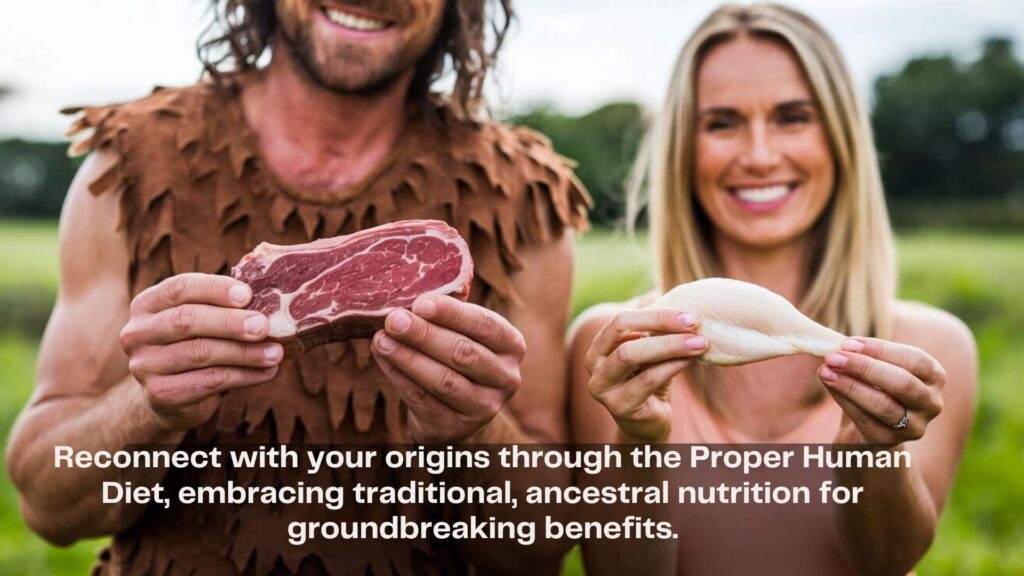
Ready to give Proper Human Diet a try? Here’s a step-by-step guide to help you begin your journey:
Step 1: Clean Out Your Pantry
The first step is to remove foods that don’t align with the PHD principles. This includes:
- Grains and grain products (bread, pasta, cereals)
- Sugars and sweeteners
- Processed and packaged foods
- Vegetable oils
- Legumes
- High-carb fruits and vegetables
Step 2: Stock Up on PHD-Friendly Foods
Now it’s time to fill your kitchen with nutrient-dense, PHD-approved foods:
- High-quality meats (grass-fed beef, pasture-raised poultry, wild-caught fish)
- Organ meats (liver, heart, kidney)
- Animal fats (tallow, lard, duck fat)
- Eggs from pasture-raised chickens
- Full-fat dairy (if tolerated)
- Low-carb vegetables in moderation (leafy greens, cruciferous vegetables)
Step 3: Plan Your Meals
Meal planning is crucial for success on Proper Human Diet. Here’s a sample day of eating:
Breakfast:
- 3-egg omelet cooked in grass-fed butter, filled with spinach and cheese
- Side of bacon or sausage
Lunch:
- Grass-fed burger patty topped with a fried egg
- Side salad with mixed greens and olive oil dressing
Dinner:
- Ribeye steak cooked in tallow
- Roasted Brussels sprouts with bacon
Snacks (if needed):
- Beef jerky
- Hard-boiled eggs
- Full-fat cheese
Step 4: Stay Hydrated and Consider Supplements
Proper hydration is essential on the PHD. Aim for at least 8 glasses of water per day. Some people find that adding electrolytes helps with the transition to a low-carb diet.
Dr. Berry often recommends certain supplements to support optimal health on the PHD, including:
- Vitamin D3
- Magnesium
- Omega-3 fatty acids (if not consuming enough fatty fish)
Always consult with a healthcare professional before starting any new supplement regimen.
Tips for Success on Proper Human Diet
- Start gradually: If you’re coming from a high-carb diet, consider easing into the PHD over a few weeks to minimize potential side effects.
- Listen to your body: Pay attention to how different foods make you feel and adjust accordingly.
- Don’t fear fat: Embrace healthy animal fats as a crucial part of your diet.
- Stay consistent: Give the diet at least 30 days before evaluating its effects on your health.
- Track your progress: Keep a food diary and monitor changes in your weight, energy levels, and any health symptoms.
Proper Human Diet Success Stories
Real-life examples can be incredibly motivating when embarking on a new dietary journey. Let’s explore some inspiring stories of individuals who have experienced significant health improvements through Proper Human Diet.
From Chronic Suffering to Vibrant Health: Mikhaila Peterson’s Lion Diet Journey
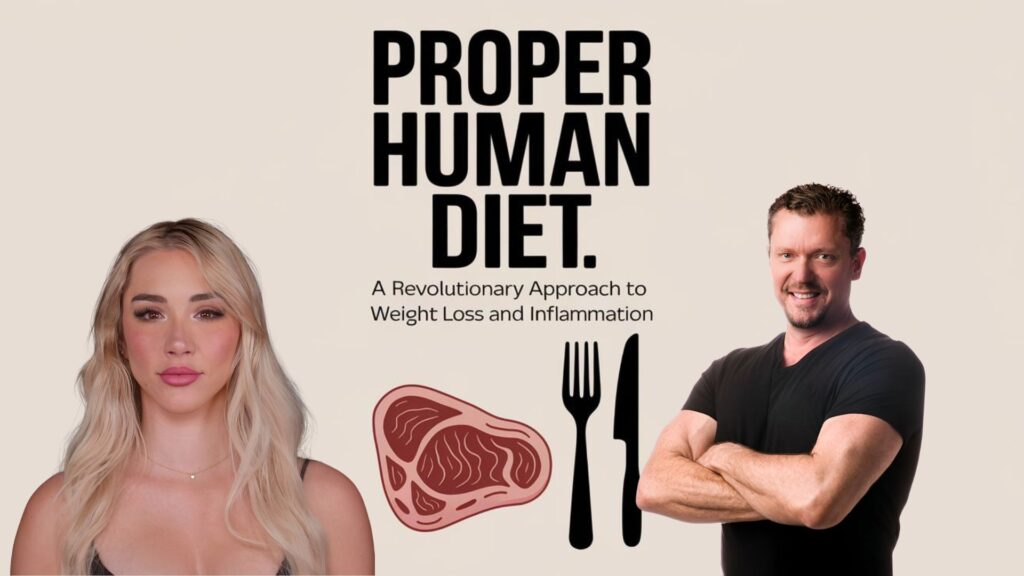
Mikhaila Peterson’s battle with chronic illness seemed never-ending. From childhood, her body waged war against itself, with juvenile rheumatoid arthritis as the primary aggressor. Depression cast a dark shadow over her teenage years, while chronic fatigue drained her vitality. Despite an upbringing nourished by home-cooked meals and later experiments with various diets, including sugar elimination and anti-Candida protocols, relief remained elusive.
Driven by desperation and armed with determination, Peterson embarked on a personal quest for answers. Her research led her down an unexpected path – one that challenged conventional wisdom about nutrition and healing. In 2017, she took a bold step into the world of extreme elimination diets, adopting what she calls the “Lion Diet.”
This carnivore-style eating plan, a variation of Proper Human Diet, stripped nutrition down to its bare essentials. Peterson’s menu became starkly simple: beef, lamb, and bison. Nothing more.
The transformation that followed stunned even Peterson herself. Within weeks, the constant ache of arthritis began to subside. As months passed, the fog of depression lifted, and her energy levels soared. Perhaps most remarkably, Peterson found herself able to discontinue all medications – including the antidepressants that had been her constant companions since age 12.
In a candid conversation with Dr. Ken Berry, Peterson shared the profound impact of her dietary overhaul. She acknowledges that the Lion Diet may seem extreme to many. However, for Peterson, it was the key that unlocked a level of health she’d long thought impossible.
Her story serves as a powerful testament to the potential of tailored nutritional approaches, even in cases where traditional treatments have fallen short. While the Lion Diet may not be suitable for everyone, Peterson’s journey highlights the importance of considering diet as a powerful tool in addressing chronic health conditions.
The Facts: Mikhaila Peterson – From Chronic Illness to Vibrant Health
One of the most well-known advocates for a meat-based diet similar to the PHD is Mikhaila Peterson. In a YouTube interview with Dr. Ken Berry, Mikhaila shared her remarkable health transformation.
From a young age, Mikhaila struggled with severe health issues:
- Diagnosed with juvenile rheumatoid arthritis at age 7
- Battled depression since her early teens
- Experienced chronic fatigue and numerous other health problems
- Prescribed multiple medications, including immunosuppressants and antidepressants
Despite following what she believed was a “healthy” standard American diet, Mikhaila’s health continued to decline. It wasn’t until she began experimenting with food elimination that she discovered the profound impact of diet on her well-being.
In 2017, Mikhaila transitioned to what she calls the “Lion Diet” – a variation of Proper Human Diet that consists solely of ruminant meat, salt, and water. The results were nothing short of transformative:
- Within weeks, her arthritis pain significantly reduced
- Over the following months, her depression and anxiety improved dramatically
- Eventually, she was able to discontinue all medications
- Achieved remission from her chronic illnesses
Mikhaila emphasizes that while her approach is extreme, it allowed her to regain her health in a way that conventional treatments never could. She believes that had she continued with her previous diet, her health would have continued to deteriorate.
John’s Journey: Conquering Type 2 Diabetes and Obesity

John, a 45-year-old software engineer, had been struggling with obesity and type 2 diabetes for over a decade. Despite trying numerous diets and medications, his health continued to decline. His turning point came when he discovered Dr. Ken Berry’s YouTube channel and learned about Proper Human Diet.
Intrigued by the science and success stories, John decided to give the PHD a try. Here’s what happened:
- Within the first month, John lost 15 pounds and noticed a significant increase in energy
- After three months, his blood sugar levels normalized, and his doctor reduced his diabetes medication
- Six months into the diet, John had lost 50 pounds and was able to discontinue all diabetes medications
- His chronic joint pain and acid reflux disappeared
John credits Proper Human Diet with not only improving his physical health but also enhancing his mental clarity and emotional well-being. He now advocates for the PHD and helps others in his community learn about this approach to eating.
Sarah’s Story: Overcoming Autoimmune Issues

Sarah, a 38-year-old teacher, had been diagnosed with multiple autoimmune conditions, including Hashimoto’s thyroiditis and psoriasis. She had tried various diets and treatments with limited success until she discovered Proper Human Diet.
Sarah’s PHD journey:
- Started with a 30-day elimination phase, consuming only beef, salt, and water
- Gradually reintroduce other animal products and select low-carb vegetables
- Within two months, her psoriasis cleared up completely
- After six months, her thyroid antibodies decreased significantly, and she was able to reduce her medication
- Experienced improved energy levels, better sleep, and weight loss of 30 pounds
Sarah now follows a modified version of the PHD, which allows her to maintain her health improvements while enjoying a wider variety of foods. She emphasizes the importance of personalization and listening to one’s body when following this dietary approach.
Addressing Common Concerns About Proper Human Diet
While Proper Human Diet has helped many people improve their health, it’s natural to have questions and concerns about such a significant dietary change. Let’s address some common worries:
Is the PHD safe long-term?
While long-term studies on exclusively animal-based diets are limited, many people have followed similar diets for years without adverse effects. Dr. Berry emphasizes the importance of regular health check-ups and working with a knowledgeable healthcare provider when making significant dietary changes.
What about fiber?
The conventional wisdom that we need plant-based fiber for gut health is challenged by proponents of the PHD. They argue that the human digestive system can function optimally without dietary fiber and that many people experience improved digestive health when eliminating fibrous plant foods.
Is the PHD environmentally sustainable?
This is a complex issue with valid concerns on both sides. Advocates of the PHD argue that properly managed livestock can actually benefit the environment through regenerative agriculture practices. They also point out that mono-crop agriculture for plant-based foods can be environmentally damaging.
What about nutrient deficiencies?
Animal foods are incredibly nutrient-dense, containing all the essential amino acids, vitamins, and minerals humans need to thrive. Some nutrients, like vitamin C, are lower in animal foods, but PHD proponents argue that the body’s need for these nutrients decreases on a low-carb diet.
Conclusion: Is Proper Human Diet Right for You?
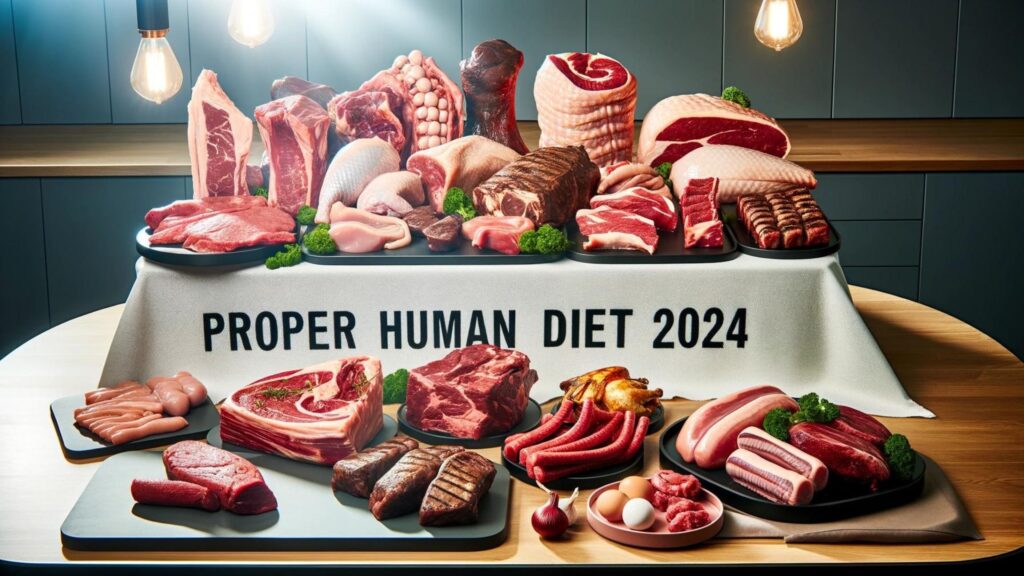
Proper Human Diet offers a unique approach to nutrition that has helped many people lose weight, reduce inflammation, and improve their overall health. Its focus on nutrient-dense animal foods and elimination of processed foods aligns with growing research on the benefits of low-carb, high-fat diets.
However, it’s important to remember that there’s no one-size-fits-all solution when it comes to nutrition. What works wonderfully for one person may not be ideal for another. If you’re considering trying Proper Human Diet, it’s crucial to:
- Consult with a healthcare professional, especially if you have existing health conditions
- Start slowly and listen to your body
- Be open to adjusting the diet to fit your individual needs
- Regularly monitor your health markers and how you feel
The journey to optimal health is personal and often requires experimentation. Proper Human Diet may be the key that unlocks a new level of well-being for you, just as it has for many others. By approaching this dietary change with an open mind and a commitment to your health, you may discover a way of eating that transforms not just your body, but your entire life.
This post contains affiliate links, and as an Amazon Associate, I earn from qualifying purchases that help keep this content free. (Full disclosure).
